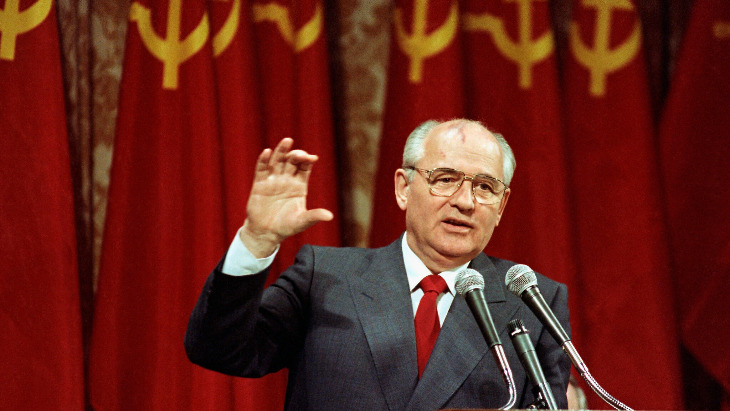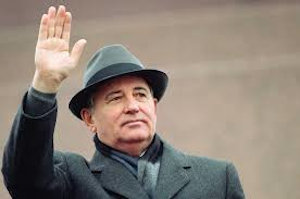 Iran’s Attack on Israel
Iran’s Attack on Israel


6 min read
10 quotes by and about the Soviet leader.
When Mikhail Gorbachev, who has died at the age of 91, assumed leadership of the Soviet Union in 1985, there was little to indicate that he would be anything other than a pragmatic Communist ruler in the mold of his predecessors. A long time committed member of the Communist party, Gorbachev believed in the ideals that had governed the Soviet Union for decades. For the country’s Jews, that meant enforcing draconian laws against Jewish rituals and Zionism. Even teaching Hebrew was outlawed. Gorbachev also continued to enforce the country’s rules against Jewish emigration: hundreds of thousands of Jews who longed to live openly as Jews in Israel or elsewhere were denied this basic freedom.
Yet Gorbachev was different than previous Soviet leaders. Frustrated with the relative poverty of the Soviet Union, he instituted a series of reforms. Glasnost - openness to new ideas - and perestroika - restructuring - became his goals. The Soviet Union slowly instituted some reforms. Gorbachev freed some political prisoners, allowed for more open elections than ever before, reduced the Soviet Union’s nuclear arsenal, and engaged politically with the West. He also began to ease many of the repressive rules targeting Soviet Jews.

In 1985, Gorbachev reestablished diplomatic ties with Israel. He began to loosen the quotas of Soviet Jews who were granted permission to leave. In 1989, 71,000 Soviet Jews were given visas to leave the Soviet Union. (At the time, the Jewish population of the entire Soviet Union was over 1.7 million.) By 1991, when Boris Yeltsin succeeded Gorbachev as leader, over 330,000 Jews had been granted permission to emigrate, and the numbers continued to grow. In 1990, Gorbachev was awarded the Nobel Peace Prize for helping to end the Cold War.
Here are ten quotes from Mikhail Gorbachev and people who knew him. Together, they help tell the story of his remarkable life and accomplishments in their own words.
In October 1991, Gorbachev broke with 70 years of Soviet precedent and publicly admitted that the Soviet Union was deeply, structurally antisemitic. The occasion was the 50th anniversary of the Nazi atrocity of Babi Yar, in which over 30,000 Jews were murdered by Nazi soldiers in Ukraine (which at the time was part of the Soviet Union).
The poisonous seeds of antisemitism arose even on Soviet soil. The Stalinist bureaucracy, publicly decrying antisemitism, in practice used it to isolate the country from the outside world, counting on chauvinism to strengthen its hold. – Mikhail Gorbachev’s representative Alexander Yakovley, delivering Gorbachev’s words, 1991
You must know, the democratic Russian public rejects and denounces antisemitism, and will do everything in its power to uproot the phenomenon from our society. – Mikhail Gorbachev, speaking in Israel, 1992
US Presidents Ronald Reagan and George H. W. Bush pressed Gorbachev to improve the Soviet Union’s treatment of Jews and to allow Jewish emigration, helping nudge the Soviet leader significantly on this issue.
Every time Gorbachev would walk into a meeting with Reagan by the mid-’80s, the first thing Reagan would do - and we see this in memoirs and oral histories - is Reagan would pull out a piece of paper with names of Soviet Jews who had been refused visas or had been somehow sent to prison for their activism and he said, ‘Well if you want to talk, first we have to discuss these names….’ – Gal Beckerman, author of When They Come for Us, We’ll Be Gone: The Epic Struggle to Save Soviet Jewry (2010)
Let’s not see five or six or ten or twenty refuseniks released at one time, but thousands, tens of thousands. Mr. Gorbachev, let these people go. Let them go. – Vice President George H.W. Bush, speaking to Gorbachev on December 12, 1987, when 750,000 protestors called for emigration of Soviet Jews from the National Mall in Washington, DC, ahead of a summit between President Reagan and Secretary Gorbachev
Although Gorbachev allowed hundreds of thousands of Jews to emigrate, his reforms came far too late for some. One young victim of Soviet repression even under Gorbachev’s rule was Mikhail Shirman, a Jew who’d been allowed to leave and later became desperately ill with blood cancer. His only hope of survival was a bone marrow transplant from his sister Inessa Fleurov, who lived in Moscow. Despite her desperate pleas, Gorbachev refused to let her leave.
Pamela Cohen, who served as the President of the Union of Councils for Soviet Jews, recalled bringing Shirman to the 1986 summit between Mikhail Gorbachev and Ronald Reagan. When a reporter from the Chicago Tribune asked Shirman (who later died from cancer) why he’d traveled to Reykjavik for the summit, Shirman gave a chilling answer:
I’ve come to meet my murderer. – Mikhail Sherman, victim of Soviet repression (quoted in Hidden Heroes: One Woman’s Story of Resistance and Rescue in the Soviet Union by Pamela Braun Cohen; 2021)
By raising hopes for (Jewish) emigration one day and dashing them the next, all to extensive press coverage, Gorbachev succeeds in diverting attention from the actual plight of Soviet Jewry – not the abysmally low emigration figures, but also the incidents of harassment, imprisonment, and intimidation of Hebrew teachers and emigration activists which have actually increased sharply in number since he took office in 1985. – “Gorbachev and the Jews,” an article in Commentary by Allan Kagedan, May 1986
When Gorbachev loosened rules for Soviet Jews to emigrate, the trickle of Jews who’d long tried to leave and start new lives in Israel or elsewhere became a flood. In 1991, Gorbachev lamented the loss of so many highly educated Jewish denizens.
The right to emigrate has been granted, but I say frankly that we, society, deeply regret the departure of our countrymen and that the country is losing so many talented, skilled and enterprising citizens. – Mikhail Gorbachev, 1991
They (Soviet Jews) had done so much for our country…nevertheless, I could not tell them not to go (because that was the moral) position of freedom. – Mikhail Gorbachev, on a visit to Israel in 1992
I see myself as a man who started the reforms that were necessary for the country and for Europe and the world. I am often asked, would I have started it all again if I had to repeat it? Yes, indeed. And with more persistence and determination. – Mikhail Gorbachev, in an interview with AP News Service, 1992
In 2008, a Russian-born businesswoman named Sofya Tamarkin attended a speech ceremony in Philadelphia, where she then lived, in which Pres. George H.W. Bush awarded Mikhail Gorbachev the Liberty Medal for ending the Cold War. Energized by the ceremony, Sofya afterwards walked up to the former Soviet leader to ask for his autograph, calling out in Russian: “Mr Gorbachev, I am a Russian-born Jew. We immigrated in 1989. I respect you and feel gratitude for the life I have today. Meeting you is a great honor. May I ask you for your autograph as a memory of this important day?”
Gorbachev didn’t hesitate in his reply. Distilling a lifetime of political work into one phrase, Gorbachev answered:
“Ваша жизнь мой автограф – Your life is my autograph.” https://www.chabad.org/theJewishWoman/article_cdo/aid/4556711/jewish/What-Mikhail-Gorbachev-Taught-Me-When-I-Asked-for-His-Autograph.htm
